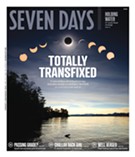Published March 6, 2013 at 2:10 p.m.
Fair Game is Seven Days’ weekly political column.
A year ago this week, voters in more than 65 Vermont municipalities rose up on Town Meeting Day to demand an end to corporate money in politics. A month later, the Vermont legislature followed suit, becoming the third in the country to condemn the Supreme Court’s devastating Citizens United ruling.
So how’s Vermont’s battle against corporate money in politics going today? Not so hot.
That’s because the Senate panel charged with overhauling the state’s campaign-finance laws is on the verge of increasing the amount of money individuals, corporations and unions can give to statewide political candidates, PACs and parties.
Now one longtime crusader for campaign-finance reform says he’d rather see the bill scuttled than approved.
“There’s no question that what the committee is currently considering would be far worse than doing nothing at all,” says Paul Burns, executive director of the Vermont Public Interest Research Group. “This is not reform. This is opening the floodgates to more money in politics.”
That wasn’t always the plan.
Ever since the U.S. Supreme Court tossed out Vermont’s strictest-in-the-nation campaign finance law in 2006, left-leaning legislators have been searching for the Goldilocks of contribution limits: low enough to reduce the flow of money in politics but high enough to withstand legal scrutiny.
Former governor Jim Douglas vetoed two attempts, while a third languished in the Senate last session.
But after the emergence of super PACs in Vermont last summer, campaign-finance reformers thought this was their year. They rallied behind legislation introduced in February by Sen. Jeanette White (D-Windham) that would have lowered contribution limits, increased the frequency of disclosure and required super PACs’ biggest donors to identify themselves in ads.
White’s bill would have capped individual, corporate and union contributions — which are currently $2000 across the board — at $500 apiece for House candidates, $1000 for Senate candidates and $2000 for statewide candidates. It also would have created a new aggregate limit for donors, barring any individual from giving more than $20,000 total per election cycle.
Then the sausage-making began.
Last week, the Senate Committee on Government Operations, which is chaired by White, amended her bill to drastically increase those and other contribution limits.
On Wednesday, they settled on a fivefold increase for statewide candidates, allowing them to collect $10,000 checks from each donor. But after Sen. Anthony Pollina (P/D-Washington) protested, on Thursday, the committee scaled that back to $5000.
“There’s no reason why anybody should give $10,000 to a political campaign,” Pollina argued to his fellow committee members.
Despite Pollina’s efforts, by the time the committee broke for a weeklong Town Meeting Day recess, it had upped just about every contribution limit under consideration.
If White’s bill is signed into law, Vermont gubernatorial candidates, political-action committees and parties will all be able to raise way more money than they can today.
So what on earth is White doing?
The Putney Dem says she was persuaded by conversations with two former statewide candidates who argued that it was impossible for those abiding by current limits to keep up with super PACs.
Unlike traditional political-action committees, which are subject to contribution and expenditure limits, super PACs can raise and spend as much as they like on political activities — so long as they don’t directly coordinate with the campaigns they back.
“[The former candidates] said two campaigns ago the limits we had originally proposed would not have seemed outrageously low, but that was before the world of super PACs,” White explains. “I understand that we don’t want to get in an arms race of spending money, but on the other hand, that’s the reality of running a campaign now.”
Which former statewide candidates changed White’s mind? She would identify only one: Democratic Gov. Peter Shumlin.
Reached on Friday, Shumlin said he’s had just one “30-second” conversation with White about the bill after an unrelated meeting.
“I said my only feeling is that with these super PACs, our current law makes it really tough for candidates to play by the rules,” he recalled. “She told me what she was doing. I said that was great. And she walked out the door.”
Shumlin said he doesn’t have any particular numbers in mind but generally feels that candidates like him should be able to raise more.
“When someone can go out and spend a million dollars and another candidate is sitting there playing by the rules, it just creates an unlevel playing field,” he said, presumably referring to Burlington’s Lenore Broughton, who donated a cool million to the conservative Vermonters First super PAC last year.
Wait a second. Isn’t that coming from a guy who easily raised more than $1.2 million himself last year in an uncompetitive reelection race against an underfunded opponent?
“Yes, as an incumbent. And it’s obviously much easier for incumbents to raise money than challengers, but I was really thinking back to the Dubie-Shumlin race two years ago,” the gov said, recalling his close contest in 2010 against former Republican lieutenant governor Brian Dubie. “In that case, had the super PACs been doing what they were doing just two years later, either one of us could be dead meat.”
But that’s exactly the point. Shumlin’s an incumbent — and incumbents have no problem convincing wealthy individuals and powerful companies to donate the maximum amount allowed by law. Last year, hundreds of Shumlin’s top donors maxed out at $2000 a pop. Next year, if White’s bill passes as currently drafted, many of those same folks will be writing $5000 checks to Shumlin’s campaign. And you can kiss the thought of a competitive election good-bye.
But if the legislature continues to place onerous restrictions on candidates trying to play by the rules, won’t they just go out and form their own super PACs and spend as much as they damn well please?
That’s essentially the argument the Vermont Democratic Party and other top Dems have been making throughout this debate: Give me the rules I want, or I won’t play by them.
But it’s naïve to think they’ll forswear super PACs even if they get what they want.
Last week, Vermonters First bought its first TV ads slamming Dems since last November’s election. That’s Broughton signaling she’s willing to pony up more despite losing big last year.
And you can bet your bottom dollar that Shumlin’s political advisers and the Vermont Democratic Party are watching — and will be ready to respond in kind. Unlike last year, when the Democratic counterpart to Vermonters First struggled to gain traction, I guarantee you that the Dems will have a plan to take full advantage of that Citizens United ruling they supposedly despise.
Just ask Shumlin — as Vermont reporters did throughout last year’s campaign — whether he wants left-leaning super PACs to skip supporting his reelection efforts.
He won’t say yes.
Beyond the question of contribution limits, there’s a more fundamental one: Why does a state that is ostensibly so opposed to corporate money in politics still allow corporations to donate directly to political candidates?
Yes, I know the Supreme Court says companies can dump as much as they like into super PACs. But the court has repeatedly and recently upheld states’ rights to ban direct contributions to candidates. Twenty-three states have such laws on the books, according to the National Conference of State Legislatures. For that matter, so does the federal government.
But not pure-as-fresh-snow-on-Camel’s-Hump Vermont.
Sen. Peter Galbraith (D-Windham) tried to change that last year with an amendment to a previous campaign-finance bill, but to no avail. When he threatened to force an up-or-down vote on the Senate floor to ban direct corporate contributions, leadership balked and killed the entire campaign-finance measure instead.
This year, Galbraith’s trying to talk the Government Operations Committee into grafting his proposal onto White’s bill. But don’t hold your breath.
“I’m not sure there’s support on the committee for it,” White says.
Pointing to last year’s 26-3 Senate vote condemning Citizens United, Galbraith quips, “The Vermont Senate wants to get corporate money out of politics, but hey, please don’t take away my contribution.”
“We think of ourselves as a clean-government state, and here we are allowing something that has been banned for a century on the federal level and is banned even in a state like Texas,” Galbraith says. “How can it be that Vermont has lower standards than Texas? To me, that’s really unthinkable.”
So why won’t Vermont eliminate corporate contributions?
Senate President Pro Tem John Campbell (D-Windsor), who opposed the Galbraith amendment last year, says there’s really no need. After all, he argues, many of the so-called corporations that donate to Vermont candidates are really just local businesses.
“These are your neighbors,” he says.
That may be true in some cases, but not for many of Campbell’s supporters. Unless Pfizer, Corrections Corporation of America, Philip Morris and Zeneca Services — all of whom donated to the pro tem’s campaign last year — recently moved to Quechee.
Nor is it true for Shumlin, unless donors Hewlett-Packard, Iberdrola Renewables, Verizon and Anheuser Busch — all of whom have business with or pending legislation before the state — moved to Putney, where Shummy can see New Hampshire from his farm.
Does the gov, who raised close to a quarter of a million dollars from corporate interests last year, support banning, um, corporate contributions?
“I haven’t given the proposal enough thought,” he says.
I bet.
“We’ll see what the legislature does,” he adds.
Indeed.
And that’s the thing. The legislature won’t do anything about banning corporate contributions, so Shummy doesn’t have to sweat it. If anything, they’ll pass White’s bill and increase corporate contribution limits.
That’s because when it comes to campaign-finance rules — not to mention redistricting — politicians care about one thing: protecting their own political careers.
Who cares that 65 Vermont towns and cities called for an end to corporate money in politics just last year? And who cares that 26 senators and 92 House members did the same.
If you’re waiting for those same legislators to do more than talk the talk, you’ll be waiting a long time.
The print version of this article was headlined "Money Talks- and Talks".
More By This Author
Speaking of Politics,
-

Bernie Sanders Sits Down With 'Seven Days' to Talk About Aging Vermont
Apr 3, 2024 -

Al Franken Blends Satire and Political Commentary at Flynn Show
Sep 19, 2022 -

Candidates for Governor Display Stark Differences at Tunbridge Fair Debate
Sep 16, 2022 -

Weinberger Removes Racial Equity Director From Oversight of Policing Study
Mar 16, 2021 -

Sirotkin Criticizes Grant Program — to a Larger Audience Than He Intended
Feb 24, 2021 - More »
Comments
Comments are closed.
From 2014-2020, Seven Days allowed readers to comment on all stories posted on our website. While we've appreciated the suggestions and insights, right now Seven Days is prioritizing our core mission — producing high-quality, responsible local journalism — over moderating online debates between readers.
To criticize, correct or praise our reporting, please send us a letter to the editor or send us a tip. We’ll check it out and report the results.
Online comments may return when we have better tech tools for managing them. Thanks for reading.













































